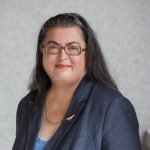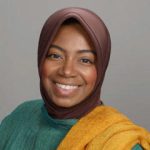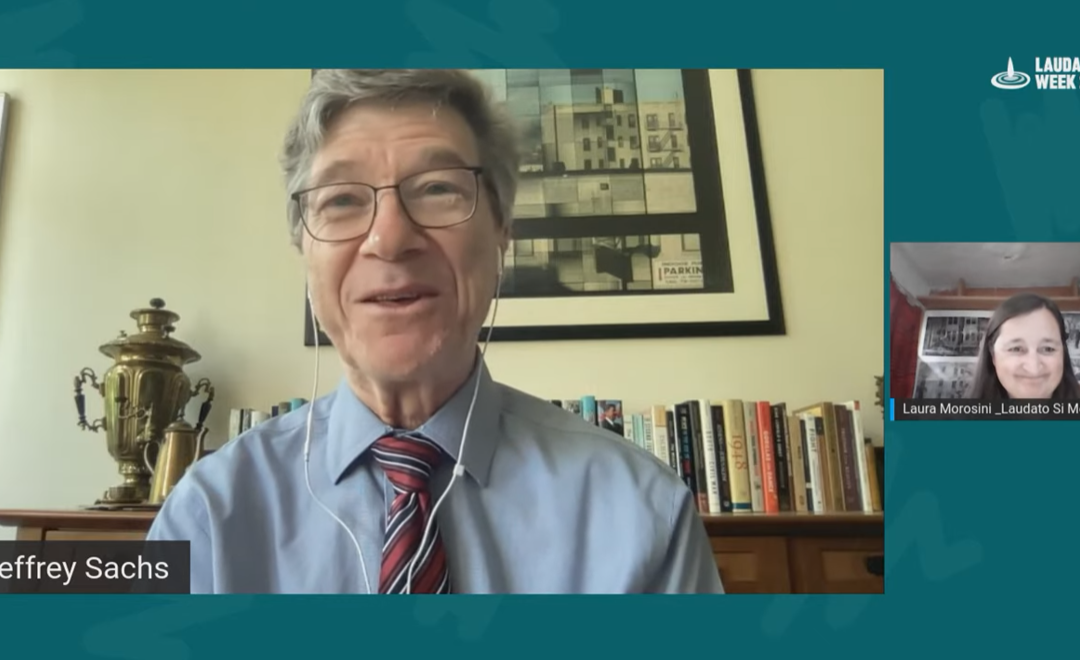To discuss the current reality of fossil fuels and the transition to sustainable development, linking the climate crisis to war, the fourth day of Laudato Si’ Week brought together a panel of experts in a webinar.
Jeffrey Sachs, senior advisor to the United Nations, author of numerous bestsellers and leader in Sustainable Development, began by recommending four key points “to save this world and save us”: ending the war in Ukraine, ending the pandemic and remembering the two key actions taken in 2015 for sustainable development, the Paris Agreement and the UN Climate Change conference.
WATCH: Watch the full conference again here:
Later, Omar Elmawi, from Uganda, coordinator of the #StopEacop coalition, participated, who spoke about the damage being caused by the installation of this pipeline of thousands of kilometers between Uganda and Tanzania; and later Whitney Terrell, director of the Environmental Justice Program of Minnesota Interfaith Power and Light, mentioned the seriousness of a similar situation in the region of Minnesota and the Mississippi River.
Svitlana Romanko, coordinator of the Support Ukraine project, made a brief intervention to mention how the war is connected to the fossil fuel issue. Then Davide Panzeri, spoke about the Taxonomy of the European Union that is being designed to understand what is green energy and what is not, and how people should inform themselves to divest from fossil fuels.
Sylvie Boukari-de Pontual, lawyer, professor and president of CCFD-Terre solidaire spoke about the importance of divestment to address the climate crisis, involving the Gospel and the Social Doctrine of the Church in these practices, and taking action to influence governments to take action.
Magdalena Noszczyk and Ashely Kitisya of the Laudato Si’ Movement shared a moment of reflection, inviting the audience to reflect on the main ideas presented by the speakers. They also invited the audience to sign the divestment treaty.
The panel was moderated by Dr. Martin Kopp of GreenFaith. The meeting began with a prayer by Bishop Jean-Pierre Vuillemin, Auxiliary Bishop of Metz, and ended with a blessing by the Bishop of Assisi, Bishop Domenico Sorrentino.
ACTÚA AHORA: Firma la petición “Planeta Sano, gente sana”
Highlights from the speakers:

Jeffrey Sachs
Jeffrey Sachs – Senior Advisor to the United Nations, bestselling author, leader in Sustainable Development.
- I am very concerned about the lack of leadership in almost every area of the world. Also in the US, my country. Right now they are not focusing enough on the security of the planet.
- Pope Francis says in Laudato Si’ that our interdependence forces us to take a sustainable plan. This encyclical has the most coherent scientific information the Vatican could salvage and its message contributed directly to the Paris Agreement.
- We are in the hottest period of the last ten thousand years.
- Governments must be invited to negotiate. End the war and start with solutions for sustainable development.
- We all inhabit the same planet, we all want a good future for our children and we all share the same air.
- Let us pray for peace and call on our governments to end war.
- Divestment is very important for our soul and for our institutions.

Omar Elmawi
Omar Elmawi – #StopEacop Coordinator
- The East African pipeline will be the largest pipeline in the world. It will cross more than 200 rivers and 400 cities. It will produce more than seven million barrels of oil per year, generating 34 million carbon emissions.
- As a continent – Africa – we have to wake up.
- The pipeline is not progress for our area, it will suck all our oil to be used in other countries. Many people will be affected, they will lose their land and will not have access to basic resources.
- Our water is in danger of being contaminated.
- This is a step backwards on our path to transition to sustainable energy.
- 40% of the world’s solar power capacity is in Africa.

Svitlana Romanko
– Stand with Ukraine Coordinator
- We are in very difficult times in Ukraine. The conflict that is happening elsewhere is connected.
- What can we do right now to stop the weapons of mass destruction that fossil fuels generate? The Fossil Fuel Non-Proliferation Treaty is one option, which many Catholic institutions have joined.

Davide Panzeri
Davide Panzeri – Journalist, from the Italian Reflection Group on Climate Change, Green Emergency Pact, Taxonomy of the European Union.
- How to know what is green energy and what is not? How to inform ourselves in order to divest from fossil fuels? There is a future for the green energy transition
- Europe is proposing a taxonomy to determine what is green and what is not.
- Being green is not only a matter of environmental sense, it is now a matter of peace.

Sylvie Boukari-de Pontual
Sylvie Boukari-de Pontual – lawyer, professor at the Catholic University of Paris, president of CCFD-Terre solidaire
- For many years we have been fighting to reduce support for fossil fuels. We try to bring the Gospel and the Social Doctrine of the Church into line with our practice.
- In France we are the first country to create a special law for just transition.
- Our aim is to put an end to the impunity of big companies because we realized that they violated human rights and we had to negotiate between the French and European Parliament and at the UN Human Rights Council.
- We also have to lobby against official governments.

Whitney Terrell
Whitney Terrell – Environmental Justice Program Director, Minnesota Interfaith Power and Light
- The Minnesota pipeline going through the Mississippi River is a serious problem for the whole region.
- There are indigenous people there who have a law that is not being respected.
- The Catholic community was active in doing numerous non-violent actions to stop the pipeline, such as prayer meetings and peaceful actions.

